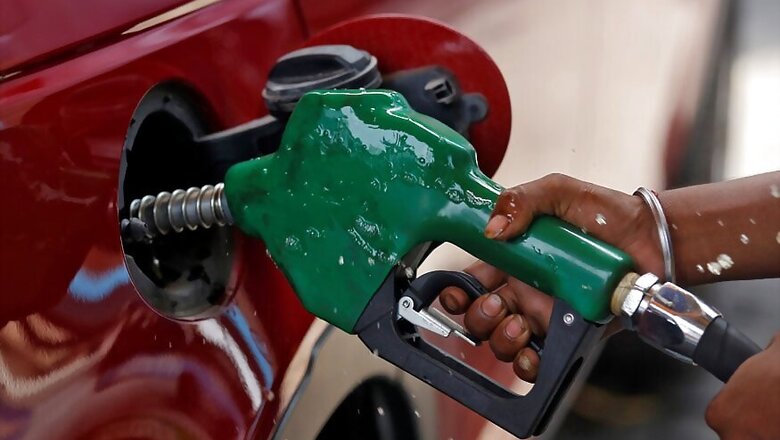
views
US crude oil futures turned negative on Monday for the first time in history, ending the day at a stunning minus $37.63 a barrel as traders sold heavily because of rapidly filling storage space at the key Cushing, Oklahoma, delivery point. The retail prices of petrol and diesel in India, however, may not be affected.
Will retail prices go down in India?
Senior Congress leader Shashi Tharoor tweeted late on Monday saying, "Will the shameless government that has milked the public with extortionate fuel taxes for six years finally relent and pass some of this windfall onto the beleaguered Indian consumer?"
However, Indian governments have seldom lowered retail rates of petrol and diesel in connection with global crude oil prices. Brent crude prices traded as low as $28 per barrel in 2015 but the retail prices were unaffected.
Moreover, crude prices have an indirect effect on retail.
How is retail prices of petrol and diesel calculated in India?
Indians pay close to 50 per cent as taxes as part of their fuel price.
Cost of a litre of petrol or diesel in India is subdivided into the following components: base price, freight costs, price charged to dealers, excise duty, dealer commission and value added tax.
Therefore, crude prices do not directly influence retail prices.
What is negative pricing?
Negative pricing is a market-based alternative to help clear supply surplus based on economic offers by lowering the offer price floor below $0 per barrel, thereby enabling market participants to signal their willingness to incur a cost to avoid curtailment from supply surplus.
Last day benchmarks plunged below zero and traded in the negative. In such a situation, producers are expected to pay potential buyers to take their output as they run out of storage space.
Why will sellers pay to buyers for their oil?
For some producers, it may be cheaper in the long run than shutting down production or finding a place to store the supply bubbling out of the ground. Experts suggest that shutting their wells might damage them permanently, rendering them uneconomical in the future.
Why are crude prices plunging?
The reason experts aren’t surprised at the sharp drop in crude prices is because consumption of gasoline (petrol) and diesel has fallen sharply with fewer vehicles on the roads, fewer tractors on farms, fewer diesel locomotives chugging along and diesel gensets operating. The basics of pricing in economics dictate that prices reach equilibrium where demand equals supply. Today, the demand isn’t enough to absorb the supply.
Is this a structural issue or a short-term trend?
How long-lasting the impact on crude prices will be is directly related to the length of the lockdown. Already, storage capacities for crude across the world are near full-up. If the lockdowns worldwide continue much longer, there is a strong possibility that more output cutbacks will happen, and that could mean the less efficient oil producers would shut off their oil taps first. And for a large section of them, restarting would be an expensive affair unless crude prices reach the pre-Covid levels. So, when demand finally revives post lockdown, the supply will also have got tightened and this could actually lead to a strong reversal in crude prices.
How do experts see crude prices faring over the next six months?
Most experts see the possibility of a strong revival in crude demand over the next one or two quarters as iffy, and this could keep prices under a lid for some time.
What could change the picture for crude?
A sharp V-shaped recovery following emergence from lockdown that causes a surge in demand could alter the picture completely.
The dependence of the global economy on crude has declined over the decades, though it still plays an important role in economies like India. Therefore, the impact on the global economy is far more moderate than in the past. However, oil money plays an important role in driving up asset prices -- stocks, real estate and so on, and therefore it has an indirect impact on wealth creation.
What do falling prices mean for India’s economy?
India being a large importer of crude and having a crude-intensive economy tends to gain when crude prices fall. This helps reduce our oil import bill and helps improve our balance of trade—imports exceed exports by far less than usual. This helps support the value of the rupee and also contain inflation.
What does it mean for the government’s coffers?
Generally, lower crude prices are good for the economy, as transport costs go down, inflation goes down and the government doesn’t need to subsidise oil as much. Also, like in the recent past, it offers the govt an option to increase levies on gasoline and diesel sales without impacting consumption demand. This helps the government earn more revenues from taxes and reduce its fiscal deficit.
Who are the likely gainers and losers?
The immediate gainers of low crude prices are those for whom derivatives are an input, like airlines and paints companies. It can also benefit oil marketing companies, but the equation, in their case is not as simple because they may be holding high cost inventories and they also get hurt by a dip in demand. The clear casualties of low oil prices are the oil producers—like ONGC and OIL.




















Comments
0 comment